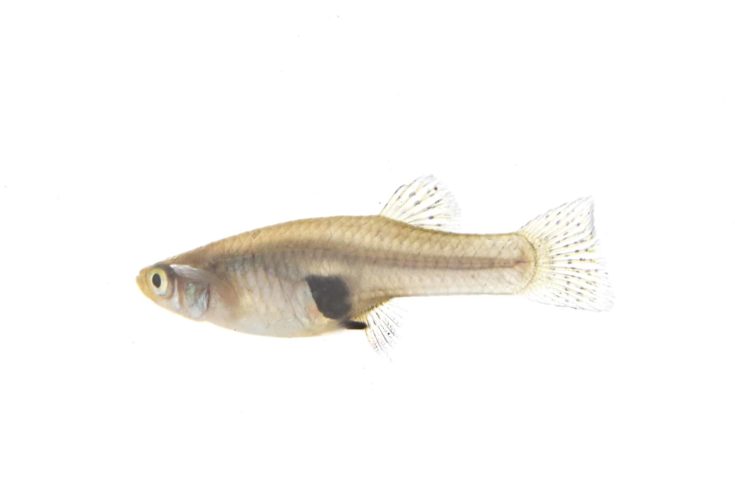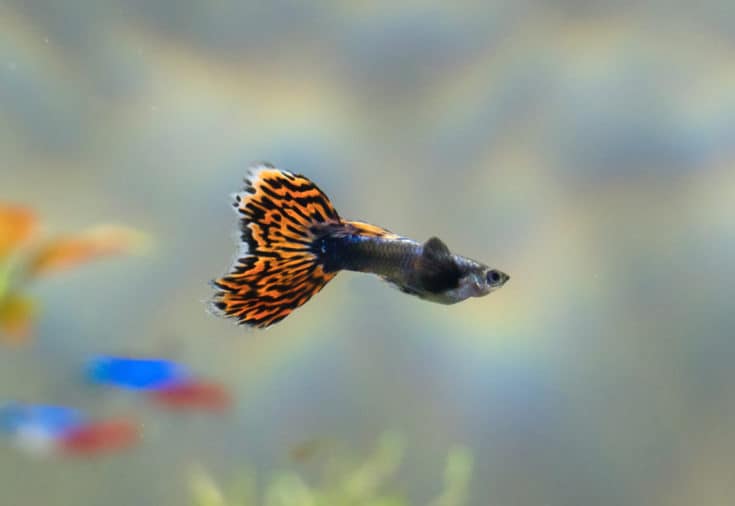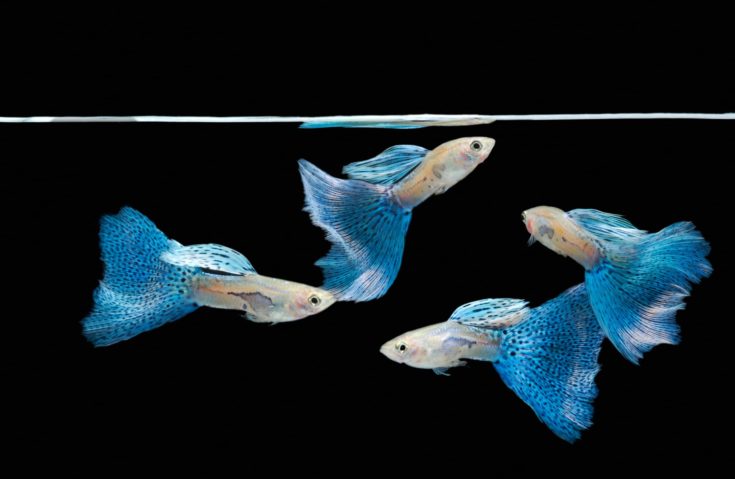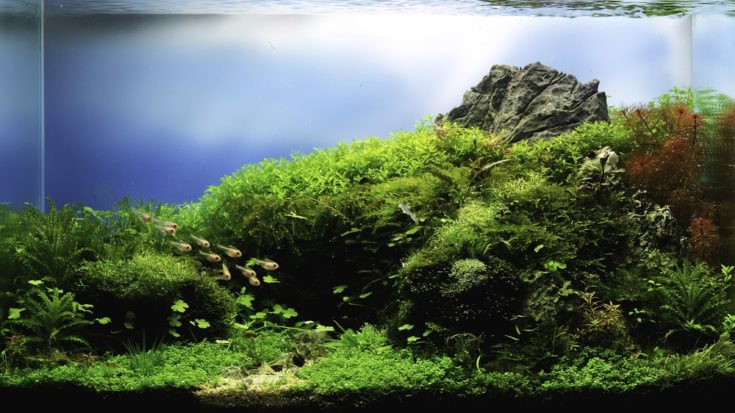Do you want some nano fish to keep in a small tank? Perhaps you want a schooling species of small fish to bring a large aquarium to life? In that case, you might be wondering if Mosquito Fish and Guppies are the same species.
So, are these two fish totally different species or the same fish just by different names? Read on for the full low-down on Mosquito Fish vs. the Guppy.
What’s The Difference Between Mosquito Fish And Guppies?
Mosquitofish (Gambusia affinis) grow to around 1½ inches long, whereas male Guppies (Poecilia reticulata) are around 1¼ inches in length, with the females of both species being slightly larger than the males.
Male Fancy Guppies are brightly colored and come in over 50 varieties. Mosquitos are drab in comparison.
Comparison Table
Mosquitofish

Size
Male – 1½ inches long
Female – 2⅞ inches long
Color
Pale olive, tan, yellow with blue shimmer
Natural habitat
New Jersey to Central Mexico, Mississippi River Basin to Illinois
Breeding
Livebearer
Lifespan
Approximately 1½ years
Fancy Guppy

Size
Male – 1¼ inches long
Female – 2⅛ inches long
Color
Comes in a array of bright, vivid colors
Natural habitat
Smooth froGuyana, South America, Barbados, Trinidadnt fin
Breeding
Livebearer
Lifespan
Approximately 2 years
Guppies and Mosquitofish both belong to the poecilia genus, which also contains Swordtails, Platys, and Mollies, and the two species share some similarities.
Both species are small livebearers, frequently producing fully-formed live fry. It’s not thought that the two species interbreed to produce a hybrid, partly because they come from different parts of the world, but also because male Mosquitofish are notoriously aggressive breeders.
Male Mosquitofish and Guppies have modified anal fins that function as reproductive organs, and the female fish of both species have a dark gravid spot close to their tail. Fancy Guppies can live for around two years, whereas Mosquitofish have a slightly shorter life expectancy of up to a year and a half.
Now, here’s a direct comparison between the Mosquitofish and the Fancy Guppy.
Male Fancy Guppy
First, let’s take a look at Fancy Guppies:
- Guppies are larger than Mosquitofish, with males reaching 1¼ inches long and females growing to 2⅛ inches.
- Male Fancy Guppies are very brightly colored, and some varieties have beautiful patterns, too. There are 55 varieties of Guppies with many different tail forms, and the male’s dorsal fin is long and flowing. Female Guppies are comparatively drab in color and lack the extravagant finnage of the males.
- The male Guppy has a long, slightly pointed anal fin.
- Male Guppies have slimmer bodies than the more rotund females.
Mosquitofish
How do Mosquito fish compare?
- Male Mosquito fish grow to reach around 1¼ inches long, with the females getting slightly larger than that.
- Male Mosquito fish have compressed bodies that are similar in shape to male Guppies, whereas female fish tend to be rounder, especially when bearing young.
- Mosquito fish are olive to tan on the upper part of their bodies and pale yellow underneath. The scales carry dark spots at the edges. Male Mosquito fish often have a blueish shimmer along their lateral line. Female Mosquito fish have a dark bar underneath the eye, and the dorsal and caudal areas are spotted.
- Female Mosquito fish and female Guppies both have short, triangular anal fins.
- Female Mosquito fish and female Guppies have dark gravid spots on their undersides near their tails. The gravid spot is absent in male Mosquito fish and male Guppies. During pregnancy, the gravid spot darkens, fading again once the fish has given birth.
Natural Habitat
Mosquito fish are found in slow streams, ditches, ponds, and lakes, ranging across New Jersey to Central Mexico. They also live in parts of the Mississippi River Basin from Illinois. Although it’s generally a freshwater fish, like the Guppy, Mosquito fish can tolerate brackish water.
In comparison, wild Guppies are found in northern South America, Trinidad, Barbados, and Guyana, where they inhabit a range of conditions, including brackish water. The flow here is generally moderate, and the habitat is thickly vegetated.
Behavioral Differences
Guppies are quite social and will happily live in loose schools in communities with other peaceful species of small fish that won’t attempt to eat them.

On the other hand, Mosquito fish are not especially sociable and prefer to live with their own species. So, if you’re looking for a nano fish to introduce to a community aquarium, the Guppy is a far better choice than the Mosquito fish.
Although there are reports that some hobbyists have crossbred the two species to produce a hybrid, experimenting in this way is not recommended. The two are unlikely to breed naturally, and any fry that might be produced would most likely not develop fully anyway.
Aquarium Conditions
The ideal aquarium habitat for both Mosquito fish and Guppies is a well-planted tank with plenty of hiding places to provide shelter for fry. Floating plants are perfect for that, as well as a few caves, pieces of driftwood, and rocky overhangs.

Mosquito fish will tolerate extremes of water temperatures that range from 33°F to 104°F. However, their preferred temperature is around 80°F. The ideal water pH is between 6.5 and 8.0.
In comparison, Fancy Guppies like a water temperature of between 74°F and 82°F, and they would die if kept in the chilly conditions that Mosquito fish can tolerate. The Guppies preferred water pH is between 7.0 and 8.0.
Both species can live in brackish conditions, too.
Mosquito Fish As Pest Controllers
You may be wondering why Mosquito fish are so-named. Why name a fish after an insect to which the fish bears no resemblance?
Well, the Mosquito fish is called that because it eats mosquito larvae as part of its wild diet of other insect species and small crustaceans.
In many areas of the world where disease-carrying mosquitoes are a problem, Mosquito fish were introduced as a means of pest control. For example, parts of California distribute Mosquito fish free of charge to local residents for them to keep in man-made pools and fish ponds to keep mosquito numbers down.
Similarly, in India, Western Mosquito fish were introduced to 660 ponds in an effort to control the mosquito population. However, in Australia, the fish are themselves now classified as an alien pest that might have exacerbated the mozzie problem by outcompeting native species for food.
And Guppies, Too?
With the alarming spread of the devastating Zika virus in South and Central America, the Caribbean, Pacific, Africa, and areas in south and southeast Asia, Guppies are being used as a cheap source of preventative precaution.
The Zika virus is spread by mosquitoes that breed in stagnant or still bodies of water. The Guppy loves to eat mosquito larvae and mosquito eggs! In fact, one Guppy can eat its own bodyweight in mozzie larvae in just one day! So, by introducing this fast-breeding fish species to mosquito-infested pools, you’re immediately waging war on the disease-spreading insects.
In fact, in Mangalore, India, Guppies have been used to reduce mosquito populations with spectacular results. So much so that cases of Zika have reportedly fallen from 30,000 cases per year to under 3,000. In other areas of India, Guppies are now successfully being used to tackle Dengue, and it’s planned to use them in areas where malaria is a big problem.
In Conclusion
I hope you enjoyed our guide on the differences and similarities between Mosquito fish and Guppies. If you did, please share it!
Guppies and Mosquito fish are both nano species that share similar water parameters and tank conditions. However, whereas Guppies are sociable community fish, Mosquito fish should be kept in a same-species tank, as they’re intolerant of other species. If you want a brightly colored fish to add activity and fun to your tank, choose a loose school of Fancy Guppies. For a more subtle addition to a small nano tank, you might prefer the Mosquito fish.
Do you keep Guppies or Mosquito fish? If you kept them together, did they breed naturally?
Tell us your story in the comments box below!
Thanks for writing this! I just got a school of mosquito fish and I found this to figure out if they were just a less fancy kind of guppy. Apparently they essentially are! Not exactly, but at least I know that I wasn’t entirely wrong to think they looked a lot like guppies! Considering I’m new to both, I’m glad my hunch wasn’t THAT far off. Also glad that I know the exact ID of the fish I have, I was guessing until I finally found this so now I know for sure. Thanks again, very informative!